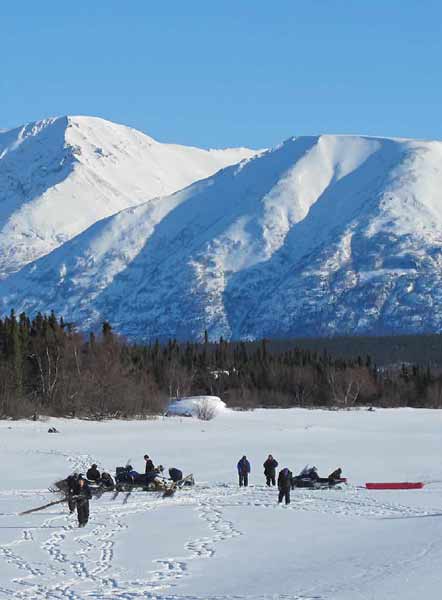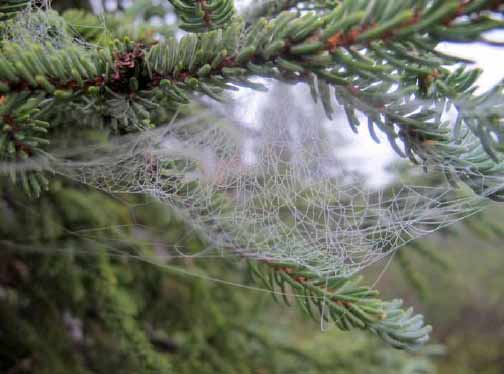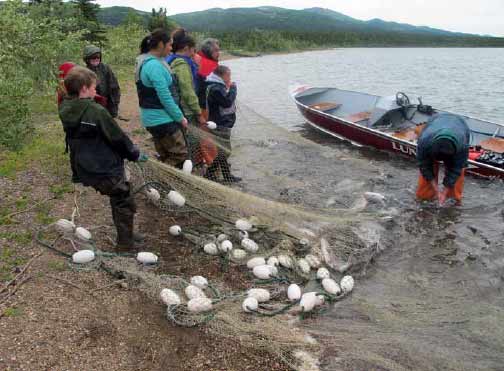The legacy of unseen footprints of the Dena'ina people has sustained the place now called Lake Clark Wilderness for centuries.

Michelle Ravenmoon
Reprinted with permission from the Lake Clark Wilderness Character Narrative
The legacy of unseen footprints of the Dena’ina people has sustained the place now called Lake Clark Wilderness for centuries. The Dena’ina people of the Lake Clark area believe that everything has a spirit and should be treated with respect. We call this ‘K’etniyi’ meaning ‘it’s saying something.’ This is the power of nature’s voice—an ancient connection to the spirit of the Dena’ina people. This is how we define wilderness. Our ancestors’ beliefs for caring for the land has been simple—respect all living things; not taking more than you need, giving something back when you take—this can be a prayer, deep thoughtful respect or a small material item such as a safety pin. What has emerged from this relationship with the land is the Dena’ina language, spirituality, cultural connection to the land, and identity.
The land provides for us and we were taught to be respectful. This respect is not questioned and we are conscious that when we interact with nature, we are praying. We harvest our food from the land, we put up salmon every summer, we hunt for meat, and we pick berries. As we stoke the fire in the smokehouse full of drying salmon, this is prayer. As we pressure cook the meat from the black bear for canning, being careful not to waste any of the meat, this is prayer. As we pick berries this is done with prayer. The relationship with the land is filled with gratitude and respect, for we are nothing without the blessings of the land in which we were raised.

Karen Evanoff
We recognize and feel the connection to weather and understand the importance of paying attention. Look to the tops of spruce trees; if there are a lot of spruce cones this means there will be a lot of snow. If there are a lot of white Hudson Bay tea blossoms, this tells us that there will be a lot of salmon this summer. Just this fall before the lakes froze, a heavy fog came over the lakes—hovering over Sixmile Lake and up through Lake Clark. A Dena’ina elder watching through the window said, “A long time ago they used to say that when the fog came in over the lakes, this means that the fog is spreading the word over the lakes—the fog is sending the message that the lakes will be freezing soon.”
Fish camp continues to be an important tradition of the Dena’ina people. The comparison used, when asked what fish camp is: It’s like Christmas, only better. We are not paying a price for gifts or experiencing a fleeting moment of joy and celebration. We are preparing all year long for our few months ofa celebration. We are coming together as family and community and sharing the gratitude of putting up fish—fulfilling our spirits, minds, emotions, and bodies from the same source and practices our ancestors did. It’s hard to put into words the feeling—the connection that ignites the spirit when it comes time for fish camp. It is an ingrained, unconscious movement that is felt when spring turns into summer. Fish camp is a communion with every aspect of putting up fish.
It’s a relationship that has been created from the time of birth, sensing when summer comes, it’s time to go back to fish camp, it’s the smell, the slime, it’s nature—connecting back to the water, bringing relatives home, it’s knowing you have fish for winter not only for your family but to share at potlucks and with relatives and friends. It’s a spiritual igniter that restores this underlying excitement after a long winter. It’s a part of life that is not questioned, whether we go to fish camp or not. It’s done every summer. It’s the contented labor of splitting fish, of stoking the smoke house fire, and of taking care and pride in putting up fish the right way. This deep-rooted way of life cannot be measured, cannot be priced, and it can be easily overlooked by an outsider, because it’s beyond the visual and the spoken.

Adrienne Lindholm
Reflecting on the idea of wilderness, Michelle Ravenmoon noted, “I have learned to appreciate even the smallest interactions between animal and land. As a child, I would watch the spiders spin webs; they put unwearied effort into their webs. I learned a respect for the work put into a web and I took great care not to destroy webs just because they were in my path. I also learned to pay attention to when spiders spun webs because spiders seem to have an ability to predict when the wind would not blow and that was web-making time. By paying attention to the spiders, I learned a technique to predict the weather. I think many people look at wilderness and think that they need to see a bear or a moose for a true experience with nature, but it is through patience and mindfulness that the true experience takes place.”
To some people, the word “wilderness” conjures thoughts that we are separate from nature, that the woods are unknown, untouched, perhaps mysterious, or even dangerous. This may create feelings of fear, excitement, adventure, longing for connection to nature . . . but when all thoughts of the individual components dissolve and we let go of the attachment or judgments we’ve given them, all we see is the beauty of the natural surroundings. We feel right at home, we want to care for and not take from the land, and we realize that we are not separate from nature but part of it. The wilderness and all that it encompasses is not a mystery; it is us and it is home. It’s as familiar as looking in the mirror.
Many places in the Lake Clark Wilderness have Dena’ina place names developed over time through stories, events, and experiences. It was not common to name a place after a person; natural places were left with a name that came from the experience and gifts it offered—‘Dilah Vena’—fish swim in lake; ‘K’dalghek’tnu’—scraping noise (of antlers) stream; and ‘Ch’kentalqeyitnu’—someone throws spear stream. Over two thousand place names like this are spread across the region and each place holds meaning. It is important that the Lake Clark Wilderness encompasses these meanings and that we continue to honor the footprints of culture as integral to our contemporary idea of wilderness.
Part of a series of articles titled Alaska Park Science - Volume 13 Issue 1: Wilderness in Alaska.
Last updated: September 21, 2017
